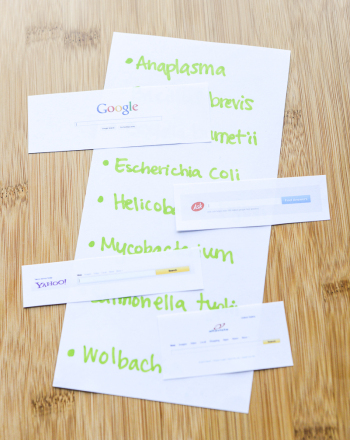
Cargando...
¿Qué puedo hacer?
226271 materialEducativo
textoFiltroFichatipo de documento Tecnología - Experimento/Práctica
Acerca de este recurso...

The Internet is big. To give an example, 3 exabytes (one exabyte is 1,073,741,824 gigabytes) of data are generated every day.Recent estimates of the total amount of data in the world put it at 300 or so exabytes in 2007. From this we can conclude that every year the world generates more information than had existed in the entirety of history up to 2007. That’s quite a lot. It’s the biggest haystack in the world, and everything we want to know is a needle.How do you find something on the Internet? Well, most of the time you would use a search engine, which is an intricate combination of computers, software, and math that helps you find what you’re looking for. There are a lot of search engines to choose from, some of the more famous being Google, Bing, and Yahoo. What makes them different? Well, that’s a secret. They have computer programs called algorithms that they use to search the web and give you the thing you’re looking for, or at least what they think you’re looking for. These algorithms are what make each search engine special, and these companies don’t like to tell people how they work. Despite this, you can still try to figure out what makes these search engines different by comparing what they give you when you search for something.The main thing that determines the usefulness of a search engine is the relevance of the results, meaning, how close are the results to what it is that you wanted to find? What we are interested in is how well search engines take what they know about the internet and direct you to what you’re looking for. This is actually a very hard , and many people spend a lot of time working out better ways to solve it.You have something in your head you want to see or learn more about. So, you type some words to try to communicate that to the search engine. These are called search terms. Inevitably, you have experienced a time when the search engine offered results that weren’t what you wanted. Sometimes the thing you’re looking for is referred to in different terms. Or maybe the word you use has many meanings and contexts, but you only want one of them. Search engines have look at these nuances and possibilities and use them as a reference to sift through exabytes of data to find sites containing the specific thing you’re seeking.
It is an educational content by education.com.
By clicking on the title of this resource, you will be redirected to the content. If you want to download the project, you just have to join the website, which now is for FREE.
Contenido exclusivo para miembros de

Mira un ejemplo de lo que te pierdes
Autores:
Categorías:
Etiquetas:
Fecha publicación: 12.5.2016
Se respeta la licencia original del recurso.
¿Quieres comentar? Regístrate o inicia sesión
Añadir a Didactalia Arrastra el botón a la barra de marcadores del navegador y comparte tus contenidos preferidos. Más info...
Comentar
0